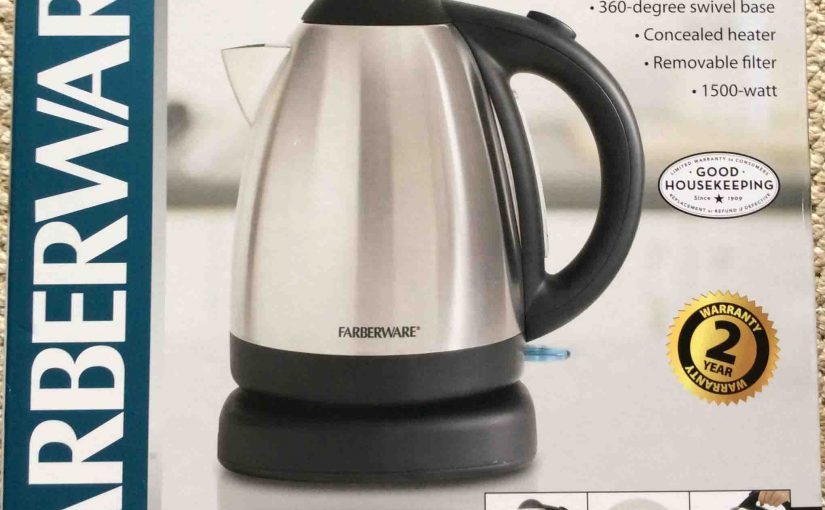We’ve heated gallons upon gallons of hard and soft water with our Hamilton Beach electric kettle. In this post, we show how to clean the electric kettle with baking soda. We’ve cleaned ours successfully many times. We also discuss how to keep the kettle clean in the first place.
We find that without routine cleaning, electric kettles can get brown or white stains. This happens a lot when you brew the tea directly in it after the water boils. That unsightliness can be hard to remove. So, wanting to keep that shiny, new look, we looked for how to keep our kettle spiffy. The tips below work quite well on the whole.
How to Clean Electric Kettle with Baking Soda? Keep it Clean to Start With
With minimal periodic cleaning, powered kettles, since they’re metal and / or glass, are easy to keep tea stain free. Your first strategy against hard water build up? Do not allow them to build up in the first place. Clean your electric kettle after every use. Make sure to unplug it first of course. Don’t let any beverage dry inside.
Regular dish detergent (for the sink, not the dishwasher) works well for general purpose and mild stain cleaning.
But if your kettle still smells of tea after cleaning than you did not clean it well enough. So, repeat the steps again. Your kettle may need several tries, or a stronger soap too.
You can also try baking soda, lemon juice, vinegar, or citric acid, to effect serious descaling and odor removal.
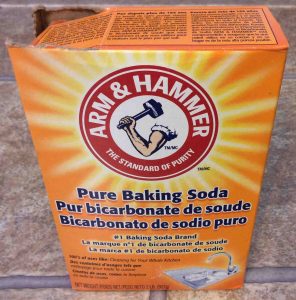
In the very worst cases of stubborn calcium deposits, we suggest trying Lime-A-Way. This is a very harsh hard water deposit remover. So we only apply it as a last resort. Further, do not use this cleaner unless the kettle’s instruction many says that it is safe. Even then, put a drop on a hidden area. Then, wait a few minutes to see if the area changes color, grows rough, or shows other signs of damage. If so, do not use Lime-A-Way.
Follow Users Guide Instructions for How to Clean Electric Kettle with Baking Soda
Most electric kettles come with an owners guide, with detailed cleaning procedures. First and most importantly, follow them, as the manufacturer probably knows best how to clean their kettles effectively. Their tips and advice, in all circumstances, supersede any tips offered here. Many recommend nothing stronger than a squeeze of dish detergent. Do not worry about this creating an aftertaste. It will not if you rinse the electric kettle and parts well.
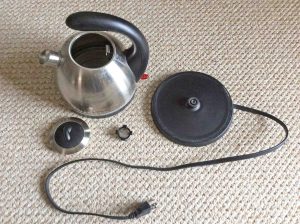
The picture above displays a typical electric kettle, completely taken apart. We have the lid, strainer, kettle stand with power cord, and the kettle itself. Clean each piece with the right cleaners. Plus, handle the pieces carefully while you work. We discuss in detail below.
Avoid Scratching and Rubbing Too Hard
Stainless steel finishes resist staining as long as you do not scratch or mar them. So avoid scouring with any rough cleansers, gritty pot scrubbers, steel wool pads, and bathtub cleaners. Avoid any metal scrubbers, such as wire brushes or burnishing tools. Even plastic or Nylon scrubbers can scratch and rub off finishes. So use them sparingly on stainless steel, chrome, and plastic parts. Save these for the really tough stains, and rely primarily on your dishcloth for routine cleanup.
Throw Out that Old Beverage
Also, keep your electric kettle clean by discarding unwanted, unused beverages right away. Best not to let hot drink stand in the kettle for long. Doing so can “bake in” that pesky yellow-brown color.
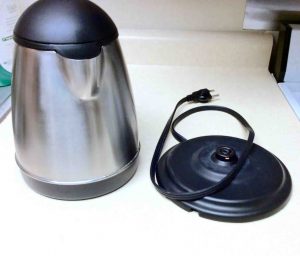
How to Clean Electric Kettle with Baking Soda? Try Soaking with Hot Water and Baking Soda
White baking soda may not completely descale your electric kettle. How well it works depends on the amount and type of minerals in your water. If it does not, then try adding two tablespoons of baking soda. This, along with a bit of dish soap, may do the trick.
Do not boil with soapy water. This quickly creates a sudsy mess. Plus, the suds erupt like a volcano out of the spout and around the lid too.
Many report that automatic dishwasher soap (E.g. Cascade) added to a full kettle of boiling water removes deposits well. When allowed to mellow until the water cools this soap really lifts those deep brown stains well. Plus, it works safely as well. It’s does not scratch and is gentle on glassware, china, and stainless steel. So it is safe to use on your glass and metal electric kettles.
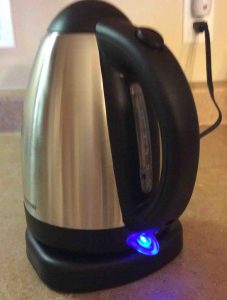
Electric Kettles Need Not Be Perfectly Clean
Some brown staining on the interior does not adversely affect the flavor of the tea brews. So you need not keep your kettle spotless. Prevent buildup of the loose residues and minerals that build up after even one use. Then your fresh brewed tea and cocoa will taste just fine.
Besides, a brown cast on the water handling parts means (to some) a well-seasoned kettle. A seasoned kettle brews better tasting hot drinks than those brand new, stain-less kettles.
General Cautions and Warnings for How to Clean Electric Kettle with Baking Soda
Disconnect the power before cleaning. Even in cordless electric teakettles, water and electricity do not mix. Otherwise, you could receive an injurious electric shock.
Also, do not immerse any parts of the kettle unless they’re submersible. You can dunk lids and strainers. But keep the kettle itself and the stand out of the water. Just fill the kettle with the cleaner. Then, let it mellow until clean. Wipe the stand with a damp soapy cloth. Then wipe it again with a clean rinsed cloth. Soak the spout strainer and lid in the sink if these become too soiled.
Note that procedures that work well for an aluminum vessel may be inappropriate for a stainless steel teakettle. So, apply the right techniques to your particular kettle. Again, consult its users manual for appropriate cleaning tips and advice.
No harsh chemicals. Avoid using acids, drain cleaners, and any strong smelling or fumy compounds. They can damage or even soften any plastic components (handles, knobs, Etc.). Plus, solvents can discolor the stainless steel finish and dull its shine.
When small amounts of vinegar do not work, heat a full-strength load in their electric kettles. This often works better than the half-and-half solution with water for thick deposits. When you have lots of scale and other hard water deposits, try strong vinegar. While this probably will not harm the teakettle, it smells horrific! If you must boil undiluted vinegar, place your kettle outside. Then, let it boil there, where the moving air will carry away that sour vinegar odor.
